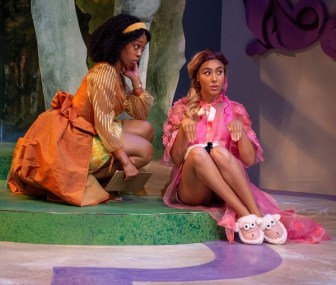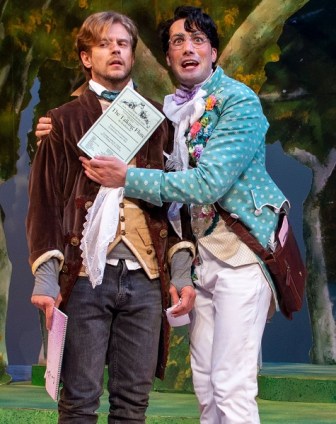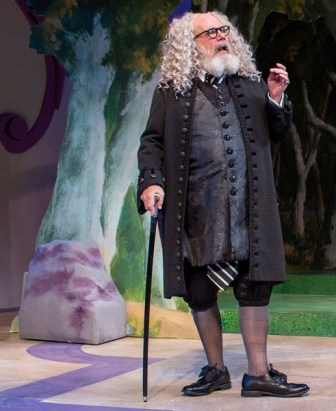
SARAH HALEY
Ty Lane, left, and Brent Harris co-star in “The Metromaniacs” at the Shakespeare Theatre of New Jersey in Madison.
Rhyming “itch” with “kitsch,” “ciao bella” with “lucky fella” and “aide-de-camp” with “gifted scamp”— and making puns like “Brittany spears” (the weapon of choice for unsophisticated Bretons) — playwright David Ives brings a sense of impish fun to “The Metromaniacs,” which the Shakespeare Theatre of New Jersey is currently presenting at Drew University in Madison. The play is about two and a half hours (including intermission) and I never felt my attention wavering — despite, or maybe because of, Ives writing the whole thing in rhyming couplets.
Seems like it would get tedious, doesn’t it? But it doesn’t, due to the cleverness of Ives’ wordplay — you’ll be hanging on every word to make sure you don’t miss a joke — the head-spinning complexities of the plot, and the actors’ willingness to embrace the unabashedly cartoonish silliness at the play’s core.
Brian B. Crowe directs the 2015 play, a translation and adaptation (Ives has called it a “translaptation”) of French playwright Alexis Piron’s 1738 “La Métromanie.” I’ve never read the original; it’s never been translated into English before, in fact. But I have to believe that Ives took some major liberties. In addition to the Britney Spears mention, and a nonchalant reference to gay marriage that would have been unthinkable in 1738, a subway is discussed in a line about one of the characters being a metromaniac.
“See, she’s a metromaniac. That’s her curse,” begins the exchange.
“Crazy for subways?” asks another character.
“No, crazy for verse,” says the first character, completing the rhyme (with “curse”).
Ives plays on “métro” meaning subway in French. But the “metro” in “Metromaniacs” refers to poetic meter.
So “metromania” means an ardent love of poetry, and three characters in this play suffer from it.
Francalou (Brent Harris) is a middle-aged poet who has failed to gain much recognition for his work, but has caused a literary sensation by writing for a literary magazine under a female pen name, Meriadec de Peaudoncqville (pronounced “podunkville”).
Damis (Christian Frost) — an equally pretentious, younger poet — is so impressed by Meriadac’s poems that he has fallen in love with her, sight unseen.
Francalou’s daughter Lucille (Billie Wyatt), who comes off as a bored Valley Girl and whose favorite word is “whatever” (she’s “pathologically aloof,” to use one of Ives’ most memorable phrases), is charmed by Damis’ poetry and has fallen in love with him (again, sight unseen).
When Damis becomes an incognito house guest of the wealthy Francalou, Lucille is unaware of his true identity. But, believing that Damis’ handsome but unintellectual and unliterary friend Dorante (Ty Lane) is Damis, Lucille falls for him.
Meanwhile, Francalou and Lucille’s servant, Lisette (DeShawn White), is being pursued by Damis’ servant Mondor (Austin Kirk). Lisette is playing Lucille in a play that Francalou wants to present to Lucille as a surprise (to cheer her up), and Damis, thinking Lisette is actually Lucille (who he believes is Meriadec), falls in love with her.
I’ll stop there. But believe me, there are many more twists and complications, and layers of confusion, that I could add. I don’t think I’ve ever heard the word “incognito” used so many times in a single play.
The play’s seventh character, Baliveau, doesn’t play a huge part in the plot, but gets many of the biggest laughs, thanks to the over-the-top antics of actor John Ahlin. Francalou’s friend, Damis’ uncle, a judge and an insufferable blowhard, he improbably embraces the opportunity to act in Francalou’s play with great gusto.
Brian Russman, the show’s costume designer, comes up with bright and fanciful outfits for many of the characters that suit the flavor of Ives’ writing.
Ives has described “The Metromaniacs” as “a comedy with five plots, none of them important.” Which is amusing, but not quite accurate.
“The Metromaniacs” is uplifting, and not just because of all the laughs it provokes. It ends, as you expect it to, with all of the twists being untwisted, true love being celebrated, and multiple pairs of characters — who, most of the time, seem like sweet people, if you can get beyond their eccentricities — getting married. Perhaps its elements aren’t truly important, on their own. But surely all of them, experienced together, add up to something with larger significance.
Watching this play, we sort through seemingly infinite, unresolvable layers of chaos, until order is restored, and love reigns. What could be more important?
The Shakespeare Theatre of New Jersey presents “The Metromaniacs” at the F.M. Kirby Shakespeare Theatre at Drew University in Madison through Sept. 4. Visit ShakespeareNJ.org.
CONTRIBUTE TO NJARTS.NET
Since launching in September 2014, NJArts.net, a 501(c)(3) organization, has become one of the most important media outlets for the Garden State arts scene. And it has always offered its content without a subscription fee, or a paywall. Its continued existence depends on support from members of that scene, and the state’s arts lovers. Please consider making a contribution of any amount to NJArts.net via PayPal, or by sending a check made out to NJArts.net to 11 Skytop Terrace, Montclair, NJ 07043.




